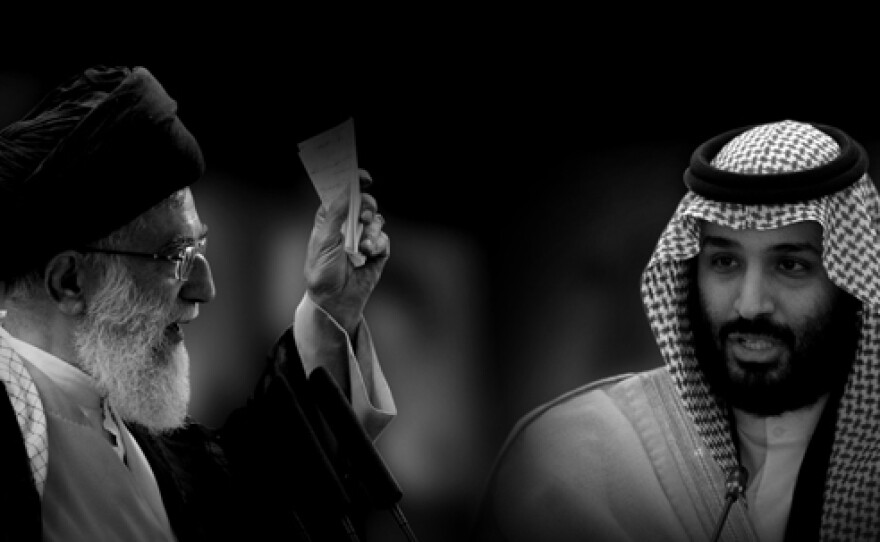From the devastating war in Syria, to the crisis in Yemen, to continuing turmoil in Iraq, much of today’s widespread violence across the Middle East has been portrayed as part of an ancient battle between the Sunni and Shia branches of Islam.
But as FRONTLINE explores in a special, two-part documentary series coming to PBS February 20 and 27, the real story is far more complex and contemporary — rooted in a 40-year rivalry between Iran and Saudi Arabia that has fueled sectarian extremism for political gain, with virtually every step the U.S. has taken along the way only ratcheting up the conflict.
In "Bitter Rivals: Iran And Saudi Arabia," FRONTLINE tells the epic, inside story of how this dangerous feud has plunged the Middle East into unprecedented levels of violence — with exclusive, on-the-ground reporting from inside both countries as well as Yemen, Iraq, Pakistan, Syria, and Lebanon.
From FRONTLINE founder and executive producer at large David Fanning, veteran FRONTLINE correspondent and producer Martin Smith, and FRONTLINE producer Linda Hirsch, the series offers a dramatic and timely road map for viewers to understand the forces shaping this complex region.
“From Iraq, where Iran and its Shia militias have emerged as victors, to Yemen, where Saudi Arabia is making a stand, we’ve found that recent conflicts are not just a sectarian phenomenon, but a potent political one,” says Smith, who has been covering the Middle East for FRONTLINE for 20 years, most recently in "Confronting ISIS," "Obama at War," "The Rise of ISIS," and "Inside Assad’s Syria."
“This series is a major commitment by public broadcasting to understanding a complicated part of the world,” says David Fanning, FRONTLINE founder and producer of this special. “It’s a credit to the system and our funders that they support this unique broadcast journalism.”
"Bitter Rivals" illuminates the essential history — and profound ripple effect — of Iran and Saudi Arabia’s power struggle. It draws on scores of interviews with political, religious and military leaders, militia commanders, diplomats, and policy experts, painting American television’s most comprehensive picture of a feud that has reshaped the Middle East.
“This Saudi-Iranian competition is primarily a competition about the direction of politics in the Middle East,” Randa Slim of the Middle East Institute tells FRONTLINE. “The two never fight, but they have access to proxy forces throughout the region that can do the fighting on their behalf.”
The series also traces how historical interventions by the U.S. have helped to amplify sectarian antagonism between majority-Shia Iran and majority-Sunni Saudi Arabia across the decades.
“We’re not so great at history in America,” Ryan Crocker, former U.S. ambassador to Iraq, Syria and several other Middle Eastern countries, tells FRONTLINE. “Well, the rest of the world takes history pretty seriously.”
"Bitter Rivals" delves into that history, unspooling the political animosity between Iran and Saudi Arabia that has been steadily building since the Iranian revolution of 1979.
The series charts the rise and ambitions of Iran in the region, as its government has seized power vacuums in Iraq and Syria and used proxy forces on the ground to control capitols from Tehran to Baghdad, from Damascus to Beirut.
And on the other side, "Bitter Rivals" traces how the Saudi government has jockeyed with Iran to try to claim regional powerhouse status, assembling a coalition of Sunni countries prepared to fight Shia Iran, and directly initiating a war in Yemen to draw a line.
It’s an escalating struggle for control that has had devastating consequences, with civilians perpetually caught in the middle — including in Yemen, where the film team became the only outside journalists allowed into the Houthi-controlled north of the country in all of 2017, and captured stunning scenes of devastation wrought by the U.S.-backed Saudi coalition.
The film also examines each country’s role in exporting extremism across the region and the world. In heated interviews with Smith, leading politicians from each country each hold the other responsible.
“Nonsense,” Saudi Minister of Foreign Affairs Adel Al-Jubier says. “The Iranians are the ones who are exporting terrorism. They're the ones who are stoking the fires of sectarianism. They're the ones who are violating international laws and norms and acceptable behavior. And they are the ones who have been on an aggressive path since 1979.”
“Well, talk is cheap,” Iran’s Foreign Minister Javad Zarif counters. “Let's look at the actions. Saudis helped Saddam Hussein for eight years. Saudis helped Al Qaeda. Saudis created Daesh. Saudis created al-Nusra. Saudis are funding terrorists who are operating in eastern Iraq. So they started this sectarian message. Not us.”
As violence continues to reverberate across the Middle East, "Bitter Rivals: Iran And Saudi Arabia" is a gripping, must-watch television event that will help viewers understand the forces that are shaping the region today.
“When elephants fight, it's the grass that suffers,” Karim Sadjadpour of the Carnegie Endowment for International Peace tells FRONTLINE. “And in today's Middle East, the two elephants are Iran and Saudi Arabia. There's been over a million casualties in the Middle East over the last decade. But they've been Syrian. They've been Yemeni. They've been Iraqi. Iranian and Saudi citizens aren't the ones that are suffering.”
WATCH ON YOUR SCHEDULE:
Episodes of FRONTLINE become available for streaming on demand during each broadcast.
JOIN THE CONVERSATION:
FRONTLINE is on Facebook, Instagram, tumblr, and you can follow @frontlinepbs on Twitter. #frontlinePBS
CREDITS:
A FRONTLINE production with Rain Media Inc. in association with BBC Arabic. The producers are David Fanning, Linda Hirsch and Martin Smith. The co-producer is Brian Funck. The field producer is Sara Obeidat. The correspondent is Martin Smith. The writers are Linda Hirsch, Martin Smith and David Fanning. The executive producer is Raney Aronson-Rath.





